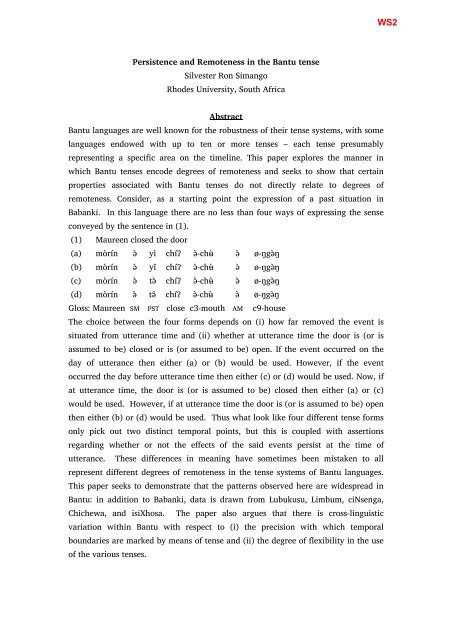here - 5th International Conference on Bantu Languages
here - 5th International Conference on Bantu Languages
here - 5th International Conference on Bantu Languages
You also want an ePaper? Increase the reach of your titles
YUMPU automatically turns print PDFs into web optimized ePapers that Google loves.
Persistence and Remoteness in the <strong>Bantu</strong> tense<br />
Silvester R<strong>on</strong> Simango<br />
Rhodes University, South Africa<br />
Abstract<br />
<strong>Bantu</strong> languages are well known for the robustness of their tense systems, with some<br />
languages endowed with up to ten or more tenses – each tense presumably<br />
representing a specific area <strong>on</strong> the timeline. This paper explores the manner in<br />
which <strong>Bantu</strong> tenses encode degrees of remoteness and seeks to show that certain<br />
properties associated with <strong>Bantu</strong> tenses do not directly relate to degrees of<br />
remoteness. C<strong>on</strong>sider, as a starting point the expressi<strong>on</strong> of a past situati<strong>on</strong> in<br />
Babanki. In this language t<str<strong>on</strong>g>here</str<strong>on</strong>g> are no less than four ways of expressing the sense<br />
c<strong>on</strong>veyed by the sentence in (1).<br />
(1) Maureen closed the door<br />
(a) mòrín ə̀ yì chíʔ ə̀-chʉ̀ ə̀ ø-ŋgə̀ŋ<br />
(b) mòrín ə̀ yî chíʔ ə̀-chʉ̀ ə̀ ø-ŋgə̀ŋ<br />
(c) mòrín ə̀ tə̀ chíʔ ə̀-chʉ̀ ə̀ ø-ŋgə̀ŋ<br />
(d) mòrín ə̀ tə̂ chíʔ ə̀-chʉ̀ ə̀ ø-ŋgə̀ŋ<br />
Gloss: Maureen SM PST close c3-mouth AM c9-house<br />
The choice between the four forms depends <strong>on</strong> (i) how far removed the event is<br />
situated from utterance time and (ii) whether at utterance time the door is (or is<br />
assumed to be) closed or is (or assumed to be) open. If the event occurred <strong>on</strong> the<br />
day of utterance then either (a) or (b) would be used. However, if the event<br />
occurred the day before utterance time then either (c) or (d) would be used. Now, if<br />
at utterance time, the door is (or is assumed to be) closed then either (a) or (c)<br />
would be used. However, if at utterance time the door is (or is assumed to be) open<br />
then either (b) or (d) would be used. Thus what look like four different tense forms<br />
<strong>on</strong>ly pick out two distinct temporal points, but this is coupled with asserti<strong>on</strong>s<br />
regarding whether or not the effects of the said events persist at the time of<br />
utterance. These differences in meaning have sometimes been mistaken to all<br />
represent different degrees of remoteness in the tense systems of <strong>Bantu</strong> languages.<br />
This paper seeks to dem<strong>on</strong>strate that the patterns observed <str<strong>on</strong>g>here</str<strong>on</strong>g> are widespread in<br />
<strong>Bantu</strong>: in additi<strong>on</strong> to Babanki, data is drawn from Lubukusu, Limbum, ciNsenga,<br />
Chichewa, and isiXhosa. The paper also argues that t<str<strong>on</strong>g>here</str<strong>on</strong>g> is cross-linguistic<br />
variati<strong>on</strong> within <strong>Bantu</strong> with respect to (i) the precisi<strong>on</strong> with which temporal<br />
boundaries are marked by means of tense and (ii) the degree of flexibility in the use<br />
of the various tenses.<br />
WS2


